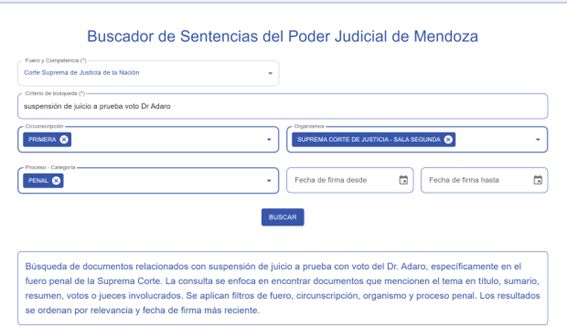Gen IA powered rulings semantic search @ Poder Judicial de Mendoza
The Poder Judicial de Mendoza is the institution responsible for administering justice in the province of Mendoza, Argentina. With a strong commitment to modernization and transparency, the organization seeks to enhance operational efficiency and service accessibility through technological innovation. Its judicial ecosystem includes courts of various instances, such as civil, criminal, labor, and administrative courts, as well as auxiliary bodies like the Public Prosecutor’s Office and the General Defender’s Office. In recent years, Poder Judicial de Mendoza has driven digital transformation initiatives aimed at optimizing case management, streamlining judicial processes, and ensuring faster and more secure access to justice for citizens and legal professionals.

To address the challenge of efficiently retrieving relevant judicial rulings from a vast repository of legal documents, DIRMOD is implementing an AI-powered semantic search engine as part of the second phase of the Data Lake project for Poder Judicial de Mendoza. This solution leverages Generative AI and Natural Language Processing (NLP) to enhance the precision of search results by understanding the context and meaning of legal texts. Unlike traditional keyword-based searches, this AI-driven approach enables judges, lawyers, and the public to ask natural language questions and receive highly relevant case law recommendations. The system will not only retrieve judgments based on legal terminology but also provide summarized insights, case references, and suggested precedents, significantly improving research efficiency while ensuring transparency and accessibility.
The data ingestion and processing pipeline will integrate structured metadata and unstructured legal texts from multiple sources, including Oracle and PostgreSQL databases, ensuring real-time updates of case law. AI models will analyze judgments to extract key legal elements, such as judges involved, legal principles applied, types of legal recourse, case resolutions, and cross-references to previous rulings. This will allow users to perform searches with filters such as jurisdiction, case type, legal subject, date ranges, and judicial interpretations, creating a more dynamic and intelligent legal research experience. Generative AI will also enhance the cross-referencing feature, identifying relevant rulings even if they are not explicitly cited in the original documents, enabling deeper legal analysis.
Additionally, the solution will feature an intuitive and secure web platform with role-based access control, ensuring that different user groups—judges, lawyers, court officials, and the general public—have appropriate access to case law. The platform will generate AI-assisted summaries of rulings, suggest related cases, and offer conversational search capabilities, allowing legal professionals to interact with the system using natural dialogue rather than rigid search queries. Administrative modules will enable role and user management, ensuring compliance with judicial data security policies, while advanced analytics tools will provide insights into search trends and frequently referenced legal topics. By deploying this cutting-edge Generative AI-driven solution, Poder Judicial de Mendoza will significantly enhance transparency, efficiency, and accessibility, meeting the public’s growing demand for agile and
Results and Benefits Achieved:
The implementation of DIRMOD’s AI-powered semantic search engine for Poder Judicial de Mendoza is expected to yield substantial improvements in efficiency, transparency, and accessibility within the judicial system. By leveraging Generative AI and Natural Language Processing (NLP), the solution will reduce legal research time by up to 70%, enabling judges, lawyers, and court officials to quickly locate relevant case law, precedents, and legal principles with high accuracy. Instead of manually sifting through thousands of judgments, users will receive contextually relevant results in seconds, improving decision-making speed and consistency across cases.
Quantitatively, the platform is expected to process and analyze over 500,000 judicial rulings from various legal databases, covering multiple jurisdictions and court levels. The system’s AI-driven insights and smart filtering options will allow judges to find precedents up to 5x faster, while lawyers will be able to build stronger, data-backed legal arguments with minimal effort. Public accessibility to legal decisions will also be enhanced, potentially increasing engagement with judicial rulings by 40%, fostering greater transparency and trust in the justice system.
From an operational standpoint, the project will significantly streamline case law retrieval, reducing administrative workload by an estimated 60%. Additionally, Generative AI-driven case summaries will enable faster review of key rulings, potentially cutting time spent per case analysis by half. The AI-powered cross-referencing system will ensure that at least 90% of relevant citations and precedents are surfaced, minimizing the risk of overlooked cases. Overall, this solution will not only modernize the judicial research process but also reinforce Poder Judicial de Mendoza’s commitment to agility, efficiency, and accessibility, addressing one of the most critical public demands for justice in the digital era.
Together with Poder Judicial de Mendoza, we demonstrated how AI technology can be the bridge to a new, more efficient way to engage with information whithin an organization.

